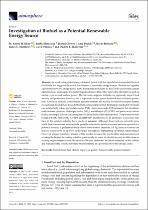| dc.description.abstract | An accelerating global energy demand, paired with the harmful environmental effects of
fossil fuels, has triggered the search for alternative, renewable energy sources. Biofuels are arguably
a potential renewable energy source in the transportation industry as they can be used within current
infrastructures and require less technological advances than other renewable alternatives, such as
electric vehicles and nuclear power. The literature suggests biofuels can negatively impact food
security and production; however, this is dependent on the type of feedstock used in biofuel production.
Advanced biofuels, derived from inedible biomass, are heavily favoured but require further
research and development to reach their full commercial potential. Replacing fossil fuels by biofuels
can substantially reduce particulate matter (PM), carbon monoxide (CO) emissions, but simultaneously
increase emissions of nitrogen oxides (NOx), acetaldehyde (CH3CHO) and peroxyacetyl nitrate
(PAN), resulting in debates concerning the way biofuels should be implemented. The potential biofuel
blends (FT-SPK, HEFA-SPK, ATJ-SPK and HFS-SIP) and their use as an alternative to kerosene-type
fuels in the aviation industry have also been assessed. Although these fuels are currently more
costly than conventional aviation fuels, possible reduction in production costs has been reported as a
potential solution. A preliminary study shows that i-butanol emissions (1.8 Tg/year) as a biofuel can
increase ozone levels by up to 6% in the upper troposphere, highlighting a potential climate impact.
However, a larger number of studies will be needed to assess the practicalities and associated cost
of using the biofuel in existing vehicles, particularly in terms of identifying any modifications to
existing engine infrastructure, the impact of biofuel emissions, and their chemistry on the climate
and human health, to fully determine their suitability as a potential renewable energy source. | en_US |

